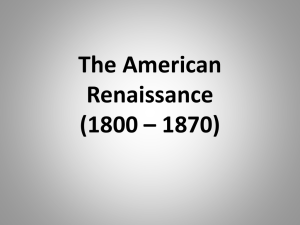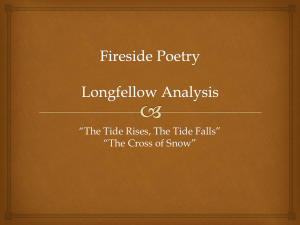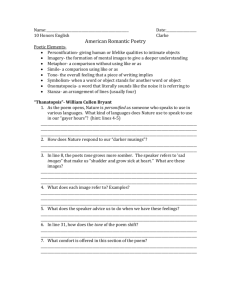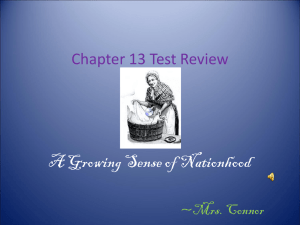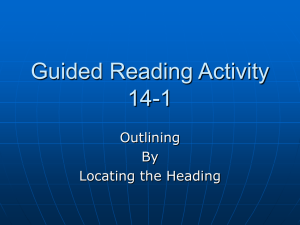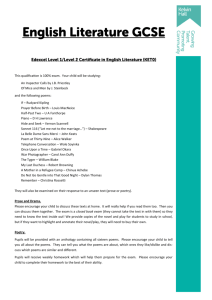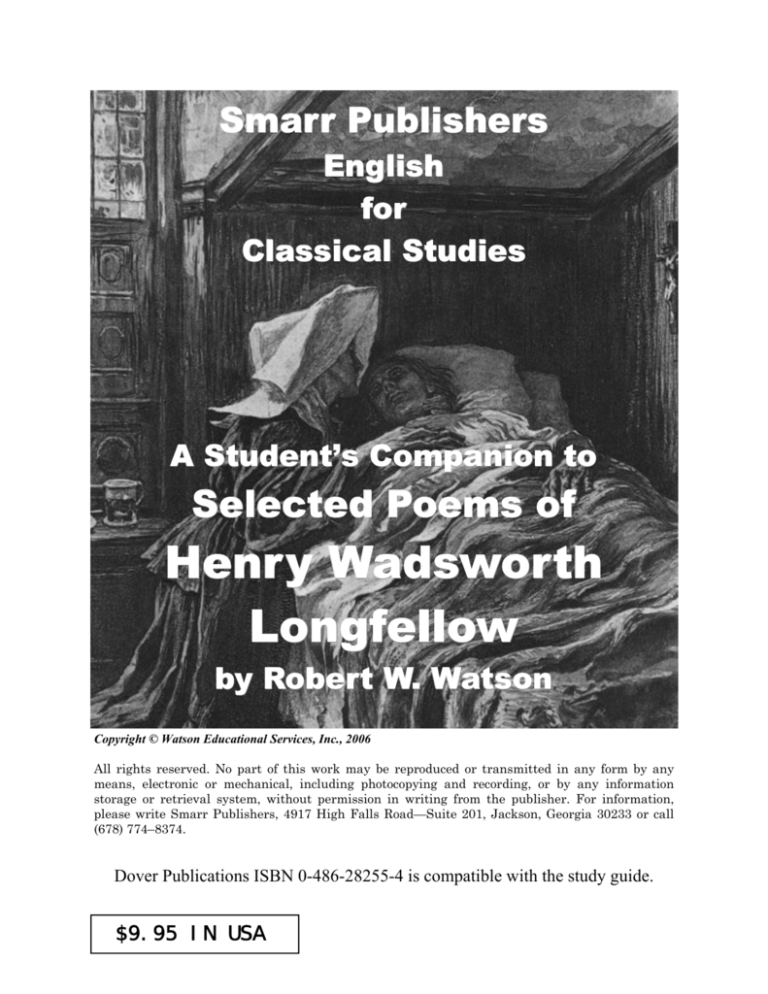
Smarr Publishers
English
for
Classical Studies
A Student’s Companion to
Selected Poems of
Henry Wadsworth
Longfellow
by Robert W. Watson
Copyright © Watson Educational Services, Inc., 2006
All rights reserved. No part of this work may be reproduced or transmitted in any form by any
means, electronic or mechanical, including photocopying and recording, or by any information
storage or retrieval system, without permission in writing from the publisher. For information,
please write Smarr Publishers, 4917 High Falls Road—Suite 201, Jackson, Georgia 30233 or call
(678) 774–8374.
Dover Publications ISBN 0-486-28255-4 is compatible with the study guide.
$9.95 IN USA
Selected Poems of Henry Wadsworth Longfellow / 1
Introduction to Selected Poems of Henry Wadsworth Longfellow
A
S THE NOTE explains in Evangeline and Other Poems,
Henry Wadsworth Longfellow represents a transition
between the classical poetry of Europe and the new
poetry of the United States. Even though he was a classicist in
form, Longfellow is considered part of the Romantic school due
to his themes that center on common men and ordinary
experiences. In addition to this, Longfellow writes with an
optimistic view of life and a love for nature, which are tenets
found in American Romanticism. Also, because his poetry was
read in most homes and schools, Longfellow belongs to that
group of poets called the Fireside, or Schoolroom, Poets.
Included in this number with Longfellow are James Russell
Lowell, John Greenleaf Whittier, and Oliver Wendell Holmes.
During his college years, Longfellow wanted to be a writer, even though his father wanted
him to study law. Excelling with his three narrative poems, Longfellow captured the hearts of
people in both Great Britain and the United States. Evangeline recounts a bitter-sweet tale of
unrequited love; The Courtship of Miles Standish honors Longfellow’s ancestors: John and
Priscilla Alden; and The Song of Hiawatha centers on the traditions and tales of the American
Indian.
Among Longfellow’s most beloved shorter poems include “The Village Blacksmith,” “The
Arrow and the Song,” and “Paul Revere’s Ride.” However, Longfellow was not only an
original poet, but a translator as well. Longfellow’s most ambitious work was the translation of
Dante Alighieri’s Divine Comedy into English.
For many years, Longfellow was a professor at Bowdoin College and later at Harvard.
Today, because of his contribution to literature, Longfellow is honored by having his bust
displayed at Westminster Abbey in the Poet’s Corner. This is a unique honor for Longfellow,
because Great Britain has honored no other American poet in this fashion.
ROBERT W. WATSON
2 / Selected Poems of Henry Wadsworth Longfellow
Selected Poems of Henry Wadsworth Longfellow
Lesson One
1.1 Vocabulary
plighted adj.
delicious adj.
diapason n.
parapet n.
1.2 Vocabulary Exercise: Select the word that does not belong in each of the following lines.
1. plighted
engaged
troubled
promised
2. delicious
tactful
pleasant
agreeable
3. diapason
full range
ruin
outpouring
4. parapet
bulwark
cage
barrier
1.3 Reading Assignment: Evangeline and Other Poems, pp.1-11
1.4 Recall Questions
1. In “The Skeleton in Armor,” what is the reason given by the “old Viking” for seeking out
the poet?
2. When the Viking became older, what did he become?
3. To whom do the “soft eyes” that were “Burning yet tender” refer?
4. How did the father react to the Viking’s proposal to his daughter.
5. What did the Viking do to the ship that was following him?
6. How did the Viking die? Why?
7. What is the rhyme scheme in “The Skeleton in Armor”?
8. In “Carillon,” to what does the poet compare the sounds of the bells?
9. What is the mind of the poet likened to?
10. According to the poet, why are the bells not noticed by the townspeople?
Selected Poems of Henry Wadsworth Longfellow / 3
11. Who does appreciate poetry?
12. In “The Belfry of Bruges,” how many times has the tower been rebuilt?
13. In “The Belfry of Bruges,” the bells caused the poet to reflect upon what?
14. What causes the “phantoms” to be “summoned back to their graves”?
15. In “The Arsenal at Springfield,” what does the poet compare war to?
16. What does the poet mean when he states, “Were half the wealth bestowed on camps and
courts, / Given to redeem the human mind from error, / There were no need of arsenals or
forts”?
17. What would be the end result of redeeming “the human mind from error”?
18. In “Mezzo Cammin,” according to the poet, what prevented his accomplishing what he
desired?
19. What does the poet likened the future which ends in death?
1.5 Critical Thinking
In “The Arsenal at Springfield,” does the poem glorify or condemn warfare? How does the
poem accomplish this message?
1.6 Bonus Thoughts
Roland: In his poem, “The Belfry of Bruges” (pronounced br›zh), Longfellow alludes to
Roland. As a figure important in the legends about Charlemagne (Charles the Great),
Roland (or Orlando in Italian) becomes the greatest defender of both Christianity and the
throne of France. Roland’s father, Milon was a distinguished knight who secretly marries
Charlemagne’s sister, Bertha. For this indiscretion, the couple is banished from France and
excommunicated by the Pope. Milon and Bertha make their way to Italy where Roland is
born. Being very poor, Roland becomes a thief. While Charlemagne was on his way to
Rome, Roland steals some of the emperor’s food. Three knights follow the boy home and
discover Bertha. Charlemagne forgives Bertha of the past and Roland becomes part of the
twelve Paladins.
Roland proved a fearless warrior when he fights and kills Ferragus the giant whose skin
was so tough that swords could not penetrate it. However, Roland learns of the one spot
where Ferragus was vulnerable. Also, Roland defeats the Saracen warrior who kept
Durindana, the sword belonging to Hector of Troy. The sword was so powerful that no
armor was able to withstand its blows.
4 / Selected Poems of Henry Wadsworth Longfellow
Nevertheless, Roland dies due to treachery in the battle of Roncesvalles. Accompanied by
a few knights, Roland was led into a trap. The gallant men encountered three armies of
Saracens. The battle was furious with many paladins and many more Saracen warriors fell.
Finally, with hope gone, Roland blew his horn with such force that birds died and the
enemy recoiled in terror. Charlemagne heard the blast and came to help Roland. However,
even though the Saracens were defeated, Roland died of his wounds and exhaustion.
“Mezzo Cammin”: The title of Longfellow’s poem, “Mezzo Cammin,” refers to the first
line of Inferno, the first of three parts of the Divine Comedy. Longfellow translated the first
line as follows:
Midway upon the journey of our life
I found myself within a forest dark,
For the straightforward pathway had been lost.
Selected Poems of Henry Wadsworth Longfellow / 5
Selected Poems of Henry Wadsworth Longfellow
Lesson Two
2.1 Vocabulary
ethereal adj.
seraglio n.
pedagogue n.
irascible adj.
2.2 Vocabulary Exercise: Select the word that does not belong in each of the following lines.
1. ethereal
potent
airy
tenuous
2. seraglio
harem
cavalier
palace
3. pedagogue
instructor
sidewalk
teacher
4. irascible
short-tempered
angry
mistaken
2.3 Reading Assignment: Evangeline and Other Poems, pp.11-29
2.4 Recall Questions
1. What is the modern name for the territory of Acadia and what country does it belong?
2. What was the nationality of the inhabitants of Acadia?
3. What religion did the Acadians practice?
4. Who was the wealthiest farmer of Grand-Pré?
5. Of all of the suitors of Evangeline, who was the only one who captured her heart?
6. What occupation did Basil have and why was he honored by the village people?
7. What was Evangeline’s nickname?
8. When Basil and Gabriel visits Bellefontaine and Evangeline, what was the main topic
discussed by the two older men?
9. According to the notary public, what happened to the statue of Justice when the innocent
girl was hanged and what was found in the statue?
10. What was the purpose of the notary public’s visit to Bellefontaine?
6 / Selected Poems of Henry Wadsworth Longfellow
11. What did the English commander tell the men of the village?
12. Who quells the riot among the men?
2.5 Critical Thinking
The Indian hunters believed the winter would be harsh because the foxes has thicker fur
than normal. There is no scientific basis for such beliefs. However, what are some other
ways which people believe that they can predict the weather by observing the actions of
animals?
The notary public states, “Daily injustice is done, and might is the right of the strongest.”
Does might make right? What is the Biblical teaching of those who are stronger than others,
whether the mighty is an individual or a majority?
2.6 Bonus Thoughts
The Name of Nova Scotia: In 1621, King James I of England gave a charter to Sir William
Alexander, who called his grant of land, New Scotland. However, since the charter was
written in Latin, the land became known as “Nova Scotia”
The Micmac Indians: The first inhabitants of Acadia were the Micmac Indians. This group
of Indians belonged to the Algonquian tribe. As early allies to the French, the Micmac aided
the French against the English and helped the settlers to learn to live in the new land.
Selected Poems of Henry Wadsworth Longfellow / 7
Selected Poems of Henry Wadsworth Longfellow
Lesson Three
3.1 Vocabulary
gleed n.
aslant adv.
oblivious adj.
sylvan adj.
3.2 Vocabulary Exercise: Select the word that does not belong in each of the following lines.
1. gleed
ember
hot coals
marsh
2. aslant
obliquely
straightly
slantingly
3. oblivious
destructive
forgetful
unmindful
4. sylvan
bosky
wooded
regretful
3.3 Reading Assignment: Evangeline and Other Poems, pp.29-42
3.4 Recall Questions
1. As they boarded the ships, were Basil and Gabriel on the same ship?
2. Who went from campfire to campfire to give consolation?
3. Before leaving, what did the English do to the village of Grand-Pré?
4. What happens to Bellefontaine after he sees what the English had done to Grand-Pré?
5. What is another name for the Mississippi River?
6. What rumor did Evangeline hear that gave her hope that Gabriel was alive?
7. Who do Evangeline’s friends suggest that she would marry, rather than try to find Gabriel?
8. Evangeline eventually joins several other Acadians. How do they travel to Louisiana?
9. Why did Evangeline miss seeing Gabriel even though they were very close to one another?
10. According to Father Felician, what do the inhabitants call the vicinity of the towns of St.
Maur and St. Martin?
8 / Selected Poems of Henry Wadsworth Longfellow
3.5 Critical Thinking
Father Felician states “affection never was wasted; / If it enrich not the heart of another, its
waters, returning / Back to their springs, like the rain, shall fill them full of refreshment.”
Are our affections eternal? Are our affections pure? According to the Bible, where is the
seat of our affections? What do the affections of a man reveal about him?
3.6 Bonus Thoughts
The Removal of the French Acadians: Control of Acadia between Great Britain and
France changed often during the seventeenth century. However, with the Treaty of Utrecht,
which ended the War of Spanish Succession, Acadia was given to the English. Soon war
between France and England was once again on the horizon, which would be called the
Seven Years’ War, or the French and Indian War. The peaceful farmers failed to convince
the British that they were neutral to the conflict. In 1755, because many refused to swear
allegiance to the British Crown, the Acadians were forced off the land, losing all of their
possessions. Many Acadians returned to France, but others went to Quebec and to the
thirteen colonies.
Selected Poems of Henry Wadsworth Longfellow / 9
Selected Poems of Henry Wadsworth Longfellow
Lesson Four
4.1 Vocabulary
inundate v.
taciturn adj.
swarthy adj.
susurrus n.
4.2 Vocabulary Exercise: Select the word that does not belong in each of the following lines.
1. inundate
overwhelm
recall
cover
2. taciturn
tactless
silent
untalkative
3. swarthy
dark
filthy
dusky
4. susurrus
whisper
murmur
grassland
4.3 Reading Assignment: Evangeline and Other Poems, pp.42–58
4.4 Recall Questions
1. Who is the man who is described as “Broad and brown was the face that from under the
Spanish sombrero / Gazed on the peaceful scene, with the lordly look of its master”?
2. Why did Gabriel leave his father and where did he go?
3. What does Basil suggest that they will do in order to comfort Evangeline?
4. While remarking that land was wonderful and was free for the taking, what does Basil warn
the newcomers about?
5. What is the significance of the word, “Upharsin”? See Daniel chapter 5.
6. What is the name of the Spanish town where the seekers learn something about Gabriel?
7. One evening, a Shawnee woman comes to the travelers camp. What happened to her
husband?
8. Once arriving at the Jesuit mission, what does Evangeline learn about Gabriel?
9. After waiting for Gabriel to return to the mission, Evangeline leaves to go to Michigan.
What does Evangeline find there?
10 / Selected Poems of Henry Wadsworth Longfellow
10. While in Pennsylvania, Evangeline thought something was pleasant to the ear. What was it?
11. How does Evangeline happened to see Gabriel again and what was his condition?
4.5 Critical Thinking
Today’s reading has several allusions to the Bible. What are these allusions, and how do
these allusions give meaning to the poem? Explain.
Explain how the two Indian tales told by the Shawnee woman foreshadow what will happen
to Evangeline and Gabriel.
4.6 Bonus Thoughts
Creoles: In the context of today’s reading, a Creole is one who descended from French
settlers, particularly in Louisiana. However, this is not the sole use of the word. The word
has been used of anyone descended from Portuguese or Spanish settlers as well. In addition
to this, a slave born in the Americas rather than one who was brought from Africa is known
by this name. In Europe, anyone who has mixed African and European ancestry is also a
Creole.
“Like a silent Carthusian”: This is a reference to an order of monks who often took vows
of silence. Founded by Saint Bruno in 1084, the order followed the eremitic (hermit-like)
life, where monks seldom ventured past the walls of the monastery. The order was very
strict and grew very slowly until the 1300s. The order is named after its first monastery at
Grand Chartreuse, near Grenoble, France.
Comanche: Originally from the mountains of Wyoming, the Comanche tribe consisted of
nomadic buffalo hunters who extended over the southern Great Plains from western Kansas
to northern Texas. Today, the Comanche nation is located in Oklahoma
Shawnee: During the early history of the United States, the Shawnee tribe inhabited the
Cumberland and central Ohio valleys. As settlers moved west after the War for
Independence, the Shawnee played a leading role by resisting settlement of the Ohio
Valley. Today, the Shawnee nation is located in Oklahoma.
Selected Poems of Henry Wadsworth Longfellow / 11
Selected Poems of Henry Wadsworth Longfellow
Lesson Five
5.1 Vocabulary
vociferation n.
saturnine adj.
proselyte n.
rowen n.
5.2 Vocabulary Exercise: Select the word that does not belong in each of the following lines.
1. vociferation
clamor
occupation
protest
2. saturnine
pacific
sardonic
bitter
3. proselyte
convert
heretic
disciple
4. rowen
gleaning
stone fence
harvest
5.3 Reading Assignment: Evangeline and Other Poems, pp.59–63
5.4 Recall Questions
1. What form of sonnet are the six poems of “Divina Commedia”?
2. In “Divina Commedia I,” what is the general meaning of the poem?
3. In “Divina Commedia II,” what did the poet think was strange about the statues of the
cathedral?
4. In “Divina Commedia III,” what is the significance of the confessions and “as the snow”?
5. According to the poet in “Divina Commedia IV,” what is perfect pardon?
6. Who is the “she” in “Divina Commedia IV”? See Bonus thoughts in this lesson.
7. In “Divina Commedia VI,” what Biblical event is alluded to in the last four lines?
8. What is the general meaning of “Changed”?
9. According to the poet in “Aftermath,” why is the second harvest not as good as the initial
one?
12 / Selected Poems of Henry Wadsworth Longfellow
10. In “The Cross of Snow,” what does the poet compare to the cross of snow on the mountain
side?
5.5 Critical Thinking
The six sonnets of “Divina Commedia” are separated into three parts (1–2, 3–4, and 5–6).
Explain how the three sections differ in tone and theme.
5.6 Bonus Thoughts
Apostrophe: Unlike figurative language that radically changes the meanings of literal
words, a rhetorical figure achieves affect by the arrangement of words. Belonging to the
class of rhetorical figures is the apostrophe which is a direct address to either an absent
person or to an inanimate object or idea. Longfellow uses examples of the apostrophe in
Evangeline (“Let me essay, O Muse!” page 37), in “Divina Commedia III” (“O poet
saturnine!” page 60), and in “Divina Commedia VI” (O star of morning and of liberty!”
page 61). Whenever the address is to a god or muse in order to assist the poet in the writing
of his work, the poet is said to use an invocation. The invocation is generally found at the
beginning of epic poems.
Star of the Morning: The morning star is the planet Venus.
Lethe and Eunoë: In “Divina Commedia IV,” Longfellow alludes to rivers found in the
underworld commonly believed by the Greeks. Five rivers existed in Hades: Phlegethon
(river of fire), Styx (river of unbreakable oath), Lethe (river of forgetfulness), Acheron
(river of woe), and Cocytus (river of lamentation). Longfellow’s use of Eunoë seems to
refer to either Acheron or Cocytus.
Dante’s Divine Comedy: The Divine Comedy is the greatest work that comes from the
Medieval era. Dante’s masterpiece is in the form of an allegory, which was written in the
vernacular—in this case, Italian. Divided into three parts (Hell, Purgatory, and Paradise),
the Divine Comedy takes the reader from sin and the flesh, to conversion, and finally to
spiritual union with God. Dante himself makes the journey. The first line of the work shows
that man is lost and is in need of help. While journeying through Hell and Purgatory, Dante
accepts the aid of Vergil to be his guide. Vergil is considered the wisest of mortals,
representing human reason. However, human reason is unable to lead Dante to Paradise.
Therefore, in Paradise, Dante’s guide is Beatrice, who represents divine love. When Dante
was only nine, he met Beatrice Portinari, whom he saw only a few times in his life.
However, to Dante, Beatrice was his inspiration for writing and his ideal of perfect love.
Since she died at age twenty-four, Beatrice fittingly becomes a prominent figure as Dante
journeys through Paradise.
Dante was considered a heretic by the Roman Catholic Church, because he openly opposed
the Church’s involvement in politics. A firm supporter of the separation of church and state,
Dante participated in local politics. However, when the Church took control of Florence,
Italy, Dante was exiled. In the year of his death, Dante finished the Divine Comedy, where
he reports no less than seven popes were in hell. His work is called a comedy, not because
the poem is humorous, but because there is a happy ending.
Selected Poems of Henry Wadsworth Longfellow / 13
Glossary for Selected Poems of Henry Wadsworth Longfellow
aslant (…-sl²nt“) adv. Slantingly; obliquely
delicious (d¹-l¹sh“…s) adj. Highly pleasing or agreeable to the senses; very pleasant; delightful
diapason (dº”…-p³“z…n) A full, rich outpouring of harmonious sound; the entire range of an
instrument or voice; either of the two principal stops on a pipe organ
ethereal (¹-thîr“¶-…l) adj. Characterized by lightness and insubstantiality; intangible; highly
refined; delicate
gleed (gl¶d) n. A glowing coal; an ember
inundate (¹n“¾n-d³t”) v. To cover with water, especially floodwaters; to overwhelm as if with a
flood; swamp
irascible (¹-r²s“…-b…l) adj. Tending to have outbursts of temper; easily angered
oblivious (…-bl¹v“¶-…s) adj. Lacking all memory; forgetful; lacking conscious awareness;
unmindful
parapet (p²r“…-p¹t) n. A low protective wall or railing along the edge of a roof or balcony; an
earthen or stone embankment protecting soldiers from enemy fire
pedagogue (pμd“…-g¼g”) n. A schoolteacher; an educator
plighted (plº“-tid) adj. Pledged; engaged to be married
proselyte (pr¼s“…-lºt”) n. A new convert to a doctrine or religion
rowen (rou“…n) n. A second crop, as of hay, in a season.
saturnine (s²t“…r-nºn”) adj. Melancholy or sullen; having or marked by a tendency to be bitter or
sardonic
seraglio (s…-r²l“y½) n. A large harem; a sultan's palace
susurrus (s‹-sûr“…s) n. A soft, whispering or rustling sound; a murmur
swarthy (swôr“th¶) adj. Having a dark complexion or color
sylvan (s¹l“v…n) adj. Relating to or characteristic of woods or forest regions; abounding in trees;
wooded
taciturn (t²s“¹-tûrn”) adj. Habitually untalkative
vociferation (v½-s¹f“…-r³“-sh…n) n. Utterance or a cry out that is loud and vehement; protest
14 / Selected Poems of Henry Wadsworth Longfellow
Poetry of Henry Wadsworth Longfellow
Vocabulary Quiz
Instructions: Match the word with its definition.
A. aslant
D. ethereal
G. irascible
J. pedagogue
M. rowen
P. susurrus
S. taciturn
B. delicious
E. gleed
H. oblivious
K. plighted
N. saturnine
Q. swarthy
T. vociferation
C. diapason
F. inundate
I. parapet
L. proselyte
O. seraglio
R. sylvan
1. _____ Melancholy or sullen; having a tendency to be bitter or sardonic
2. _____ Wooded; abounding in trees
3. _____ Hot coals; ember
4. _____ Having a dark complexion or color
5. _____ A low protective wall or railing
6. _____ A large harem or sultan’s palace
7. _____ A second crop in a season
8. _____ A new convert
9. _____ Slantingly; obliquely
10. _____ A schoolteacher; an educator; an instructor
11. _____ Habitually untalkative; silent
12. _____ Lacking all memory; forgetful; unmindful
13. _____ Characterized by lightness; intangible; highly refined
14. _____ To cover with water; overwhelm; swamp
15. _____ Utterance or a cry out that is loud and vehement; protest
16. _____ Highly pleasing or agreeable to the senses; delightful
17. _____ A soft, whispering or rustling sound: a murmur
18. _____ A full, rich outpouring of harmonious sound
19. _____ Engaged to be married
20. _____ Tending to have outbursts of temper; easily angered
Answer Keys to Selected Poems of Henry Wadsworth Longfellow
Vocabulary Exercise, Lesson 1
1. troubled
2. tactful
3. ruin
4. cage
Lesson 1
1. The Viking wants to tell him a story unknown to the world.
2. He became a marauder (a pirate).
3. This is a reference to the blue-eyed maid who the Viking wooed.
4. The father laughed with scorn.
5. The Viking had the ship rammed and it sank.
6. He deliberately fell upon his own sword, because his wife had died.
7. a a a b c c c b
8. He compares the sounds to the many poems in the world.
9. The mind of the poet is like the belfry that holds the bells.
10. The townspeople become used to the sounds and do not pay any particular notice to them.
11. The reader who appreciates poetry is one who shuts himself away from the world to dream
of thoughts that he was cherished.
12. Three times.
13. He recounts visions of the past, the history of Flanders.
14. The poet is aroused from his reverie by the sound of drums.
15. War is compared to music; however, the music is unpleasant and not in harmony with
nature.
16. The money used for war could have been used for education or even perhaps the spread of
the Gospel.
17. The result would be hearing the voice of Christ saying, “Peace.”
18. He states that “sorrow, and a care that almost killed” prevented him.
19. He compares the pleasant sights and sounds of the past to the sounds of a great and
powerful waterfall (“the cataract of Death”).
Vocabulary Exercise, Lesson 2
1. potent
2. cavalier
3. sidewalk
4. mistaken
Lesson 2
1. Nova Scotia, which is a province of Canada.
2. The dwellers were Frenchmen.
3. The Acadians were Roman Catholic.
4. Benedict Bellefontaine
5. Gabriel Lajeunesse
1
6.
7.
8.
9.
Basil was a blacksmith; a blacksmith has always been highly esteemed.
The farmers called her Sunshine of Saint Eulalie
They discussed the reasons for the English warships being near the village.
Lightening struck the statue, dislodging the scales, and the people found the necklace that
the little girl was accused of stealing. A magpie took the necklace.
10. He was recording the dower of Evangeline
11. The commander announced that the men were under arrest, that they and their families
would be deported, and that the king now owns their lands and homes.
12. Father Felician
Vocabulary Exercise, Lesson 3
1. marsh
2. straightly
3. destructive
4. regretful
Lesson 3
1. No. They were separated.
2. The priest, Father Felician
3. They set fire to all of the buildings.
4. He dies.
5. Another name for the Mississippi River is “Father of Waters.”
6. Basil and Gabriel were together and they went to the prairies, or to the Louisiana lowlands.
7. They thought Evangeline should marry Baptiste Leblanc, the son of the notary public.
8. They traveled in a boat down the Mississippi River.
9. Evangeline’s boat had stopped and was hidden by trees; Gabriel’s boat was going north,
opposite to the direction of Evangeline.
10. They call the area the “Eden of Louisiana.”
Vocabulary Exercise, Lesson 4
1. recall
2. tactless
3. filthy
4. grassland
Lesson 4
1. The man is Basil.
2. Basil states that Gabriel was restless and moody, not longer able to enjoy a quiet life.
Gabriel left with some trappers for the Ozark Mountains in the west.
3. Basil announces that they will follow Gabriel in order to find him.
4. Basil told them to beware of the fever.
5. The word means “to divide.” Apparently, Evangeline thought that it was heaven’s will that
she be separated from Gabriel forever.
6. The name of the town is Adayes.
7. Her husband was a Canadian who was killed by the Comanches.
8. Gabriel had been there less than a week ago.
2
9. She found only Gabriel’s deserted cabin (lodge).
10. She liked hearing the “Thee” and “Thou” of the Quakers.
11. Evangeline helped to nurse people who became sick of the plague. Gabriel was dying in an
hospital where Evangeline was helping.
Vocabulary Exercise, Lesson 5
1. occupation
2. pacific
3. heretic
4. stone fence
Lesson 5
1. Italian sonnet
2. Man requires time to get alone without the commotion of the world.
3. The statues mixing mythological creatures (dragons and gargoyles) with scenes of the
crucifixion.
4. As we confess our sins, the Lord is faithful to forgive us our sins and will cleanse us from
all unrighteousness.
5. He states that perfect pardon is perfect peace.
6. Beatrice
7. These lines allude to the day of Pentecost found in Acts chapter 2.
8. As one gets older, his perspective changes regarding life and familiar things.
9. The second harvest is mixed with immature grass and weeds.
10. He compares this cross to the cross that he wears next to his heart.
Longfellow
1. N
2. R
3. E
4. Q
5. I
6. O
7. M
8. L
9. A
10. J
11. S
12. H
13. D
14. F
15. T
16. B
17. P
18. C
19. K
20. G
3
4

